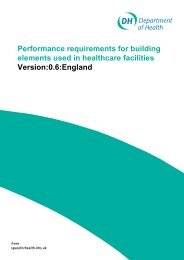Early Life Nutrition and Lifelong Health - Derbyshire Local Medical ...
Early Life Nutrition and Lifelong Health - Derbyshire Local Medical ...
Early Life Nutrition and Lifelong Health - Derbyshire Local Medical ...
Create successful ePaper yourself
Turn your PDF publications into a flip-book with our unique Google optimized e-Paper software.
BMA Board of ScienceConclusions• Many young women have diets of poor quality <strong>and</strong> inadequate nutritional status. Lesshealthy diets are more common among women of low educational attainment, <strong>and</strong> amongwomen who have low income <strong>and</strong> who are food insecure. Although evidence of effectiveinterventions to improve the diets of young women is limited, this does not mean that thegoal should not be pursued vigorously. Both nutrition education <strong>and</strong> counselling have beenshown to improve women’s nutrition knowledge <strong>and</strong> behaviour.• Breastfeeding rates are low in the UK, <strong>and</strong> it is less common among disadvantaged women.Interventions that educate women about the benefits <strong>and</strong> practice of breastfeeding, <strong>and</strong>that promote baby friendly policies <strong>and</strong> practice, are effective at promoting the initiation<strong>and</strong> prolonging the duration of breastfeeding.• Current studies of complementary feeding show wide variations in practice in the UK.There are few studies of interventions to influence the timing <strong>and</strong> nutritional content ofcomplementary feeding in developed countries.• Infant diet is strongly linked to mother’s diet – suggesting that interventions to improve thediets of young women will also have direct consequences for children’s diets.• Effective interventions are needed to improve the nutrition of young women of childbearingage. Such interventions may influence the way in which mothers feed their children as wellas influencing the diets of women themselves. They will therefore have beneficial healtheffects across generations.• Efforts to encourage the initiation <strong>and</strong> to prolong the duration of breastfeeding need tocontinue <strong>and</strong> be extended. The ten steps to successful breastfeeding <strong>and</strong> the Baby FriendlyHospital Initiative guidelines should become a minimum st<strong>and</strong>ard of care. Action is alsoneeded to improve the opportunities for women to breastfeed in public places <strong>and</strong> tosupport continued breastfeeding in women who return to work.• The <strong>Health</strong>y Start scheme provides support for eligible women <strong>and</strong> children throughprovision of food vouchers <strong>and</strong> vitamin supplements, <strong>and</strong> needs to be promoted widely.Its impact on the nutrition of mothers <strong>and</strong> young children should be evaluated at anational level.• Other gaps in the evidence should be addressed including interventions to supportbreastfeeding mothers in the workplace <strong>and</strong> interventions to optimise the timing <strong>and</strong>content of complementary feeding.<strong>Early</strong> life nutrition <strong>and</strong> lifelong health 65



